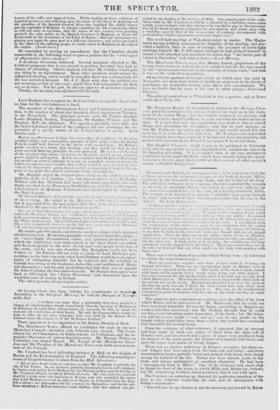The members of the Birmingham Loyal and Constitutional Associa- tion,
to the number of about four hundred, dined together on Tuesday, in the Town-hall. The principal persons were Sir Francis Burdett. Lords Bradford, Sandon, Teignmouth. Sir Eardley Wilmot, and Mr. Dugdale. M.P., the chairman. The speeches generally were dull and the better-informed portion of the company did not encourage the ex- pectation of a speedy return of the Conservatives to power. Lord Sandon said— Had lie no other reason to hope for success than his confidence in the tran- scendant ability and conscientious principle of their great leader, Sir Robert Peel, he would look forward to the future with assured Lope. Sir Robert's public conduct was before that meeting, and they would see that he had never swerved from any principles be ever professed. He was now at the head of the strongest Opposition ever known in England. and his speedy return to power might be anticipated. But he was confident that Sir Robert Peel would not sacrifice an atom of principle to secure an immediate return to power: lie believe no man was more sensible that nothing would be more field bt do. inte- rests tq' the Consereatire party, than to seek pr a temporary triumph at the ex- pense of any point that proved a principle worth contending for. Mr. Dugdale urged the Conservatives to be on the alert to secure a majority at the next election. [ Ay. but when is that to be'] Sir Earthy Wilmot said that Ministers had many lukewarm supporters, who were firmly attached to the Protestant Establishment, and who would support a Government of Moderate Reformers that should reject the alliance of the Rom i sh party. Sir Francis Burdett delivered the most lively and entert:iii;ing speech of the evening. Ile railed at the Ministers as O'Connyil's crtatures but it appeared from the newspapers that they were at last somewhat shocked by the spectacle of their imminent peril— The son of Lord Duneannon bad extressed di-apprmal of the pri:wiple• un which the Precursor Society u established : witerenpon the ;art at Precorsor took occasion to inform Lord Batten/num. that if lie was not to be supported. the Whigs must go out. Daniel O'Connell promised to take rare of that ; and, like a very disreputable character in the last new novel, said to the Ministers, "It' you can hang me. remember 1 can hang you." He would quit onnell, and refer to another subject which attracted attention just now. He meant a pamphlet attributed to Lord Brougham,— an "exceedingly ill-mannered, coarse, and ignorant production,"—in which the aristocracy were represented as the most brutal and selfish, and the tradespeople as the most slavish and venal people in the face of the earth ; and he was sure therefore that Brougham could not have written it. Sir Francis did not wish to allude to Lord Durham's pro- ceedings, as the time was near when Lord Durham would have an oppor- tunity of vindicating himself; but he believed that the rebellion in Canada was owing to the weakness, imbecility, and vacillation of Minis- ters themselves ; and the only good thing they had done was to appoint Sir John Colborne the Governor-General. Sir Francis then again went back to O'Connell, the " Great Precursor," and descanted upon the wretched state of society in Ireland.
The other speeches du not require notice.


























 Previous page
Previous page